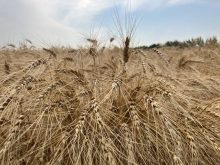Prince Edward Island should develop policies for its ag and forestry sectors aimed at creating an “aggressive biofuels portfolio” for the province, a provincial committee recommended Monday.
The province’s environmental and renewable industries committee (ERIC) delivered its report Monday to the provincial cabinet. ERIC was asked to report on the availability of suitable feedstocks and make recommendations on developing these resources for renewable energy for P.E.I.
The province has accepted all eight of ERIC’s recommendations, Development and Technology Minister Richard Brown said in a release Monday.
Read Also

Pea, lentil outlooks have some positive signals – Penner
As pulse growers consider what to plant this spring, Chuck Penner of Leftfield Commodities Research said there is some optimism in the Canadian pulse market. Penner gave a presentation at the Saskatchewan Pulse Growers meeting in Swift Current on Feb. 4.
“Cabinet concluded that the sustainable development of biofuels has the potential to diversify Prince Edward Island’s energy mix, strengthen the Island economy, and help meet regional greenhouse gas emission reduction targets,” he said. “As well, biofuels may provide alternative sources of income for Island farmers.”
The committee found local feedstocks to be readily available or that they could reasonably be developed to support biofuel projects. Biomass stocks such as wood, cereals, grasses, straw and crop residues particularly offer “significant” potential for space and water heating and electrical generation.
“Pure plant oils, already part of an on-farm pilot project, could be enhanced through their use as a biofuel,” the committee noted, such as in modified diesel engines, heating oil blends and biodiesel.
While biodiesel and ethanol feedstocks aren’t readily available locally, they could be developed to support small- to large-scale production, ERIC said.
“With P.E.I.’s annual expenditure of $334 million on imported, petroleum-based energy products, the advancement of made-in-P.E.I. biofuels should clearly be encouraged in the overall public interest of Prince Edward Islanders,” the committee wrote.
ERIC also recommends the province set up a new interdepartmental biofuels committee to evaluate proposals for biofuel projects and studies and make recommendations to the province by September this year on the feasibility of a mandate for minimum biofuel content in P.E.I. motor and heating fuels — with and without a requirement for local production.














